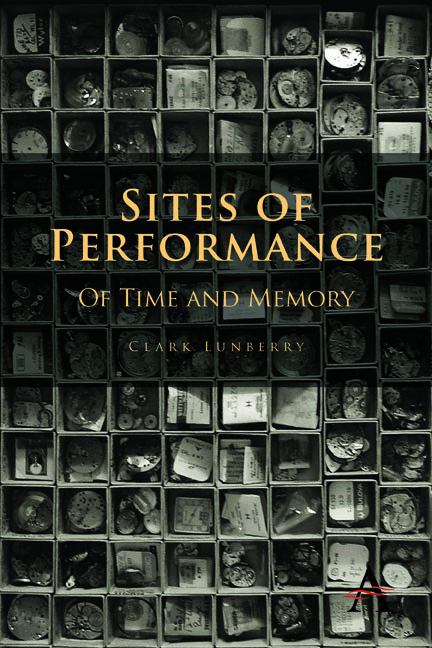Book contents
- Frontmatter
- Dedication
- Contents
- Acknowledgements
- Preface
- I Stagings: Plays of Space
- II Sightings: Sites of Time
- Chapter 5 Antonin Artaud's Unending Death Rattle
- Chapter 6 Writing upon Theaters of Tragic Thought
- Chapter 7 Figures of Speech: Ann Hamilton's Installations of Absence
- Chapter 8 Illuminated Theater: The Stages of James Turrell
- Chapter 9 Suspicious Silence: Walking Out on John Cage
- Chapter 10 In Living Memory: Morton Feldman's Departing Landscapes
- Postscript Seeing in Plain Sight—Installations in Flight
- Bibliography
- Index
Chapter 9 - Suspicious Silence: Walking Out on John Cage
from II - Sightings: Sites of Time
Published online by Cambridge University Press: 05 November 2014
- Frontmatter
- Dedication
- Contents
- Acknowledgements
- Preface
- I Stagings: Plays of Space
- II Sightings: Sites of Time
- Chapter 5 Antonin Artaud's Unending Death Rattle
- Chapter 6 Writing upon Theaters of Tragic Thought
- Chapter 7 Figures of Speech: Ann Hamilton's Installations of Absence
- Chapter 8 Illuminated Theater: The Stages of James Turrell
- Chapter 9 Suspicious Silence: Walking Out on John Cage
- Chapter 10 In Living Memory: Morton Feldman's Departing Landscapes
- Postscript Seeing in Plain Sight—Installations in Flight
- Bibliography
- Index
Summary
“What we re-quire is / silence ; but what silence requires / is that I go on talking.”
—John Cage, “Lecture on Nothing”“Well, shall we
think or listen? Is there a sound addressed
not wholly to the ear?”
—William Carlos Williams, “The Orchestra”This is certainly not the first, nor will it be the last reference to the composer John Cage; he has been spoken of already a number of times as a figure whose attention to the details of listening have proven useful in our thinking about silence, and the performance of its absence. In particular, Cage's early experience in an anechoic chamber, what Herbert Blau has referred to as that “ur-setting of theatricality” (Reality 248), has offered us again and again a kind of object lesson in such careful listening, a site for the situating of silence that eliminates silence (while, as the poet William Carlos Williams wrote, thoughtfully discerning nonetheless sounds “addressed / not wholly to the ear”). In what follows, I will once more return to Cage but this time less as a reference point for others, and more as a finally deserved focus onto him alone. If in the previous chapter, we examined the isolating rooms of James Turrell and the “wordless” experience sought within them, in this chapter such wordlessness, the desire for such a state of silence, is again brought forth only to find yet another variation emerging on Agamben's experimentum linguae, one that is not unlike that which was finally found within Turrell's own luminous spaces.
- Type
- Chapter
- Information
- Sites of PerformanceOf Time and Memory, pp. 119 - 132Publisher: Anthem PressPrint publication year: 2014



